Peugeot 208 vs Suzuki S-Cross – Differences & prices compared
Compare performance, boot space, consumption and price in one view.
Find out now: which car is the better choice for you – Peugeot 208 or Suzuki S-Cross?
The Peugeot 208 (Hatchback) comes with a Petrol, Electric or Petrol MHEV engine and Manuel or Automatic transmission. In comparison, the Suzuki S-Cross (SUV) features a Full Hybrid or Petrol MHEV engine with Automatic or Manuel transmission.
When it comes to boot capacity, the Peugeot 208 offers 352 L, while the Suzuki S-Cross provides 430 L – depending on how much space you need. If you’re looking for more power, decide whether the 156 HP of the Peugeot 208 or the 129 HP of the Suzuki S-Cross suits your needs better.
In terms of consumption, the values are 14.10 kWh4.50 L per 100 km for the Peugeot 208, and 5.10 L for the Suzuki S-Cross.
Price-wise, the Peugeot 208 starts at 20200 £, while the Suzuki S-Cross is available from 21800 £. Compare all the details and find out which model fits your lifestyle best!
Peugeot 208
The Peugeot 208 exudes a distinctive French charm, combining sleek lines with an assertive stance on the road. Inside, it offers a modern and sophisticated cabin, complete with intuitive technology and high-quality finishes to enhance the driving experience. Its agile handling and efficient performance make it a delightful choice for both city commuting and longer journeys.
details @ www.media.stellantis.com
@ www.media.stellantis.com
 @ www.media.stellantis.com
@ www.media.stellantis.com
 @ www.media.stellantis.com
@ www.media.stellantis.com
 @ www.media.stellantis.com
@ www.media.stellantis.com
Suzuki S-Cross
The Suzuki S-Cross emerges as a versatile crossover, blending urban agility with a rugged presence suited for diverse terrains. Its design combines sleek, modern aesthetics with practicality, offering a spacious interior that comfortably accommodates passengers and cargo for varied journeys. Drivers will appreciate the advanced technology features that enhance both driving pleasure and safety, making the S-Cross a well-rounded option for those seeking reliability and style in a compact SUV.
details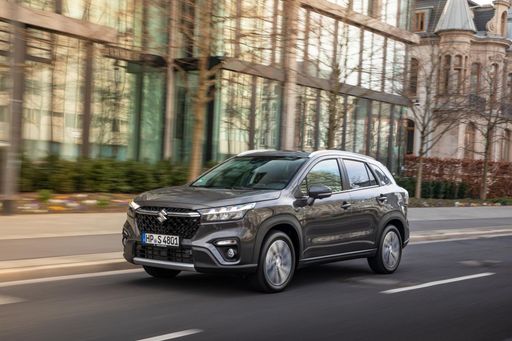 @ Suzuki
@ Suzuki
 @ Suzuki
@ Suzuki
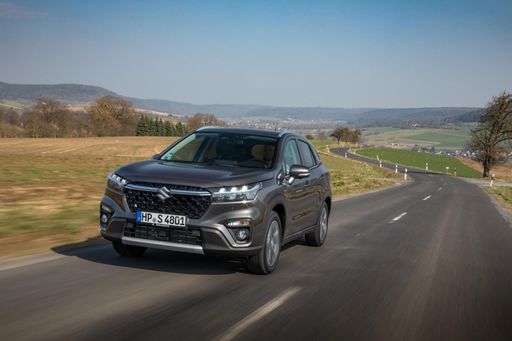 @ Suzuki
@ Suzuki
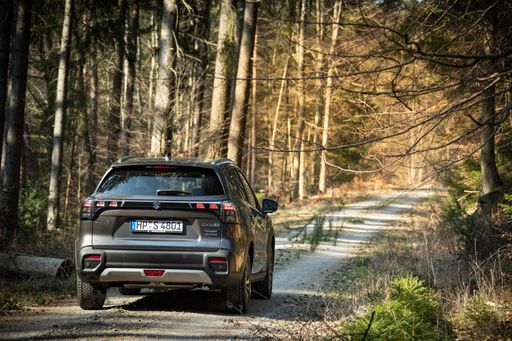 @ Suzuki
@ Suzuki
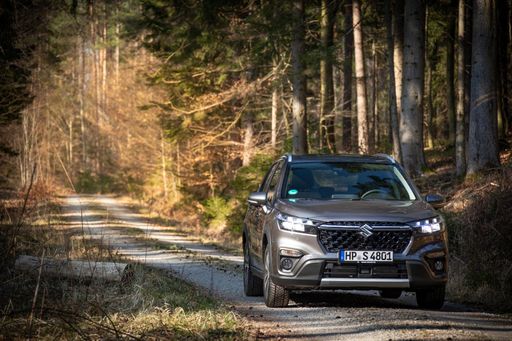 @ Suzuki
@ Suzuki
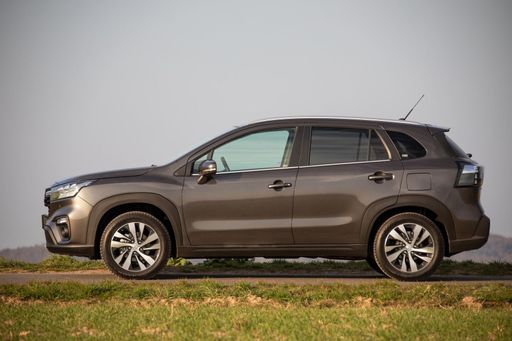 @ Suzuki
@ Suzuki
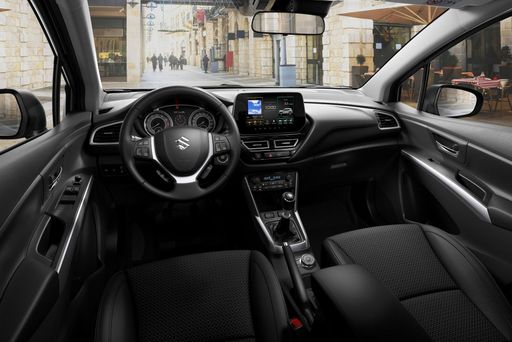 @ Suzuki
@ Suzuki

|

|
|
|
|
Costs and Consumption |
|
|---|---|
|
Price
20200 - 35100 £
|
Price
21800 - 33700 £
|
|
Consumption L/100km
4.5 - 5.2 L
|
Consumption L/100km
5.1 - 5.8 L
|
|
Consumption kWh/100km
14.1 - 15.4 kWh
|
Consumption kWh/100km
-
|
|
Electric Range
362 - 432 km
|
Electric Range
-
|
|
Battery Capacity
46 - 51 kWh
|
Battery Capacity
-
|
|
co2
0 - 117 g/km
|
co2
116 - 131 g/km
|
|
Fuel tank capacity
44 L
|
Fuel tank capacity
47 L
|
Dimensions and Body |
|
|---|---|
|
Body Type
Hatchback
|
Body Type
SUV
|
|
Seats
5
|
Seats
5
|
|
Doors
5
|
Doors
5
|
|
Curb weight
1165 - 1530 kg
|
Curb weight
1280 - 1435 kg
|
|
Trunk capacity
309 - 352 L
|
Trunk capacity
430 L
|
|
Length
4055 mm
|
Length
4300 mm
|
|
Width
1745 mm
|
Width
1785 mm
|
|
Height
1430 mm
|
Height
1580 mm
|
|
Payload
380 - 430 kg
|
Payload
375 - 405 kg
|
Engine and Performance |
|
|---|---|
|
Engine Type
Petrol, Electric, Petrol MHEV
|
Engine Type
Full Hybrid, Petrol MHEV
|
|
Transmission
Manuel, Automatic
|
Transmission
Automatic, Manuel
|
|
Transmission Detail
Manual Gearbox, Dual-Clutch Automatic, Reduction Gearbox
|
Transmission Detail
Automated Manual, Manual Gearbox
|
|
Drive Type
Front-Wheel Drive
|
Drive Type
Front-Wheel Drive, All-Wheel Drive
|
|
Power HP
101 - 156 HP
|
Power HP
116 - 129 HP
|
|
Acceleration 0-100km/h
8.3 - 10.9 s
|
Acceleration 0-100km/h
9.50 s
|
|
Max Speed
150 - 200 km/h
|
Max Speed
175 - 195 km/h
|
|
Torque
205 - 270 Nm
|
Torque
235 Nm
|
|
Number of Cylinders
3
|
Number of Cylinders
4
|
|
Power kW
74 - 115 kW
|
Power kW
85 - 95 kW
|
|
Engine capacity
1199 cm3
|
Engine capacity
1373 - 1462 cm3
|
General |
|
|---|---|
|
Model Year
2023 - 2025
|
Model Year
2024
|
|
CO2 Efficiency Class
D, A, C
|
CO2 Efficiency Class
D
|
|
Brand
Peugeot
|
Brand
Suzuki
|
Peugeot 208
A Glimpse into the Future: The New Peugeot 208
The Peugeot 208, with its sleek design and innovative features, continues to set benchmarks in the automotive industry. As a hatchback, it seamlessly blends style with practicality, offering the perfect solution for urban driving and long-distance travels alike. In this article, we delve into the technical details and innovations that distinguish the latest iterations of the Peugeot 208.
Engine Options: Efficiency Meets Performance
The Peugeot 208 provides an array of engine options catering to different driving preferences. Featuring both petrol Mild-Hybrid technology and full electric powertrains, it offers a versatile range designed to accommodate eco-conscious drivers as well as those who prioritise performance.
With power outputs ranging from 101 PS to 156 PS, and a torque span of 205 Nm to 270 Nm, these machines are meticulously engineered to provide thrilling yet efficient drives. The petrol versions utilise a three-cylinder 1199 cm³ engine, optimising fuel consumption between 4.7 and 5.4 L/100km, while the electric e-208 models boast an impressive range of up to 410 km on a single charge.
Advanced Transmission Systems
The Peugeot 208 models come equipped with an advanced automatic transmission system, employing either a dual-clutch automatic gearbox or a manual transmission, depending on the chosen variant. These systems guarantee smooth gear transitions, thus enhancing driving pleasure and overall efficiency.
Performance and Environmental Considerations
From a performance standpoint, the Peugeot 208 impresses with its ability to accelerate from 0 to 100 km/h in between 8.3 to 10.9 seconds, depending on the model chosen. This level of performance is complemented by a top speed ranging from 150 to 200 km/h, ensuring that the 208 is more than capable of holding its own on the motorway.
With environmental consciousness at the forefront, the vehicle's CO2 efficiency class ranges from A to D, further establishing the Peugeot 208 as a responsible option for modern drivers keen on reducing their carbon footprint.
Comfort and Practicality: A Class Act
The interior of the Peugeot 208 reflects its exterior's stylish flair. It comfortably seats five passengers and offers a boot capacity of 265 to 309 litres, accommodating both city commutes and weekend getaways. Advanced comfort features and a state-of-the-art infotainment system ensure that rides are as enjoyable for passengers as they are for the driver.
Cost Considerations
The Peugeot 208 manages to strike a remarkable balance between cost efficiency and luxury. With prices ranging from €22,950 to €40,825, there is a variant to suit most budgets while still providing a premium experience. Additionally, the monthly costs and costs per kilometre are kept in check, making it an economically sound choice in the long term.
Dimensions and Design: Compact yet Spacious
Measuring 4,055 mm in length, 1,745 mm in width, and 1,430 mm in height, the Peugeot 208 maintains a compact profile that is perfectly suited to tight urban environments. Despite its manageable size, it offers ample space inside, thanks in part to clever design and engineering.
Conclusion: A Future-Proof Choice
The Peugeot 208 is a testament to modern automotive innovation. Whether powered by traditional engines or fully electric powertrains, it consistently delivers on performance, efficiency, and style. The combination of cutting-edge technology and sustainable practices places the Peugeot 208 as a forward-thinking choice for drivers seeking a vehicle that epitomises the best of contemporary motoring.
Suzuki S-Cross
Introducing the Versatile Suzuki S-Cross
The Suzuki S-Cross stands out as a remarkable offering in the competitive SUV market, combining practicality with modern technology. This car is designed to cater to a diverse range of drivers, offering innovative hybrid technology alongside a comfortable and spacious interior.
Efficient Performance: The Heart of the S-Cross
At the core of the Suzuki S-Cross are its hybrid engine options. Customers can choose between a mild-hybrid or a full-hybrid engine, which both provide impressive fuel efficiency and driveability. The mild-hybrid 1.4 Boosterjet comes with a manual transmission, while the 1.5 Dualjet full-hybrid offers an automatic option. This flexibility ensures that there's an S-Cross model for everyone.
Technical Brilliance and Engineering
The Suzuki S-Cross excels with a range of technical specifications. Offering between 116 to 129 PS, the vehicle also boasts a CO2 efficiency class of D, maintaining an eco-friendly performance with CO2 emissions ranging from 118 to 132 g/km. With a top speed of up to 195 km/h and a nimble 0-100 km/h acceleration of just 9.5 seconds, the S-Cross demonstrates dynamic capability without compromising on environmental consciousness.
Innovative Design and Spacious Comfort
The exterior dimensions, with a length of 4300 mm, a width of 1785 mm, and a height of 1580 mm, provide a substantial presence while offering a spacious interior. The boot space of 430 litres, combined with a seating capacity for five, ensures that the S-Cross is as practical as it is comfortable.
Driving Experience and Versatility
The S-Cross provides a choice between front-wheel drive and the all-terrain ALLGRIP all-wheel-drive system, allowing for flexibility depending on the driver's needs. The suspension and handling have been finely tuned to deliver a smooth driving experience across various conditions, further underscoring the vehicle's versatility.
Cost Efficiency and Ownership
When it comes to cost, the Suzuki S-Cross offers competitive pricing, with monthly costs ranging from €909 to €1045 and an economical cost per kilometre of 36.4 to 41.8 cents. This makes it an attractive option for those seeking cost-effective motoring without sacrificing performance or style.
Conclusion
The Suzuki S-Cross remains an impressive contender in the SUV segment, offering a blend of efficient hybrid engines, practical design, and state-of-the-art technology. Whether you're navigating city streets or exploring off the beaten path, the S-Cross provides a reliable and stylish driving solution.
What drivetrain options does the Peugeot 208 have?
The Peugeot 208 is offered with Front-Wheel Drive.
The prices and data displayed are estimates based on German list prices and may vary by country. This information is not legally binding.
